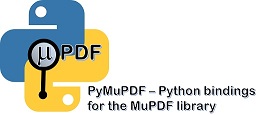Release date: May 1, 2017
- Ruikai Liu
- Jorj X. McKie
This is version 1.11.0 of PyMuPDF (formerly python-fitz), a Python binding which supports MuPDF 1.11 - "a lightweight PDF and XPS viewer".
MuPDF can access files in PDF, XPS, OpenXPS, CBZ, EPUB and FB2 (e-books) formats, and it is known for its top performance and high rendering quality.
With PyMuPDF you therefore can also access files with extensions *.pdf, *.xps, *.oxps, *.cbz, *.fb2 or *.epub from your Python scripts.
See the Wiki for more information, news (https://github.com/rk700/PyMuPDF/wiki/Change-and-News-Log), release notes and usage recipies.
If you had not previously installed MuPDF, you must first do this. This process highly depends on your system. For most platforms, the MuPDF source contains prepared procedures on how to achieve this. If you decide to generate MuPDF from sources, be sure to download the official release from https://mupdf.com/downloads/. MuPDF's GitHub repo contains the current development source which probably is incompatible with PyMuPDF.
Once MuPDF is in place, installing PyMuPDF comes down to running the usual python setup.py install.
Also refer to this document for details.
AUR: https://aur.archlinux.org/packages/python2-pymupdf/
The required MuPDF version in the official Ubuntu repositories is often not timely available, so you need to build it from source. Make sure to add -fPIC to CFLAGS when compiling.
When MuPDF is ready, edit setup.py in PyMuPDF and comment out the line of library_dirs=[] to specify the directory which contains libmupdf.a and other 3rd party libraries. Remove crypto from libraries in setup.py if it complains. Visit this Wiki page for a MuPDF installation experience from sources: https://github.com/rk700/PyMuPDF/wiki/Experience-from-an-Ubuntu-installation.
First, install the MuPDF headers and libraries, which are provided by mupdf-tools: brew install mupdf-tools
Then you might need to export ARCHFLAGS='-arch x86_64' since libmupdf.a is for x86_64 only.
Finally, please double check setup.py before building. Update include_dirs and library_dirs if necessary.
You can download pre-generated binaries from here that are suitable for your Python / Windows combination, and thereby avoid any compilation hassle. Please refer to this document for details.
If you do want to make your own binary however, have a look at this Wiki page. It explains how to use Visual Studio for generating MuPDF in quite some detail. Also do not hesitate to contact us if you need help.
Please have a look at the basic demos, the examples which contain complete, working programs, and the recipies section of our Wiki https://github.com/rk700/PyMuPDF/wiki.
You have a variety of options to access the documentation:
- You can view it online at PyPI.
- You can download a Windows compiled html.
- You can download a PDF.
- You can download a HTML ZIP file.
- PyMuPDF Version 1.10.0
- PyMuPDF Version 1.9.3
- PyMuPDF Version 1.9.2
- PyMuPDF Version 1.9.1
- Code compatible with MuPDF v1.8
- Code compatible with MuPDF v1.7a
- Code compatible with MuPDF v1.2
PyMuPDF is distributed under GNU GPL V3. The implied use of MuPDF also implies its license GNU AFFERO GPL V3. A copy of both licenses are included in this repository.
You can also find PyMuPDF on the Python Package Index PyPI.
We invite you to join our efforts by contributing to the the wiki pages.
Please submit comments or any issues either to this site or by sending an e-mail to the authors Ruikai Liu, Jorj X. McKie.
